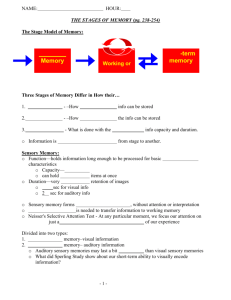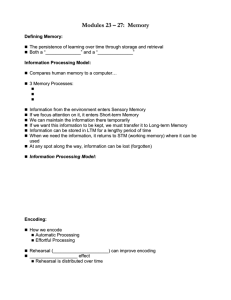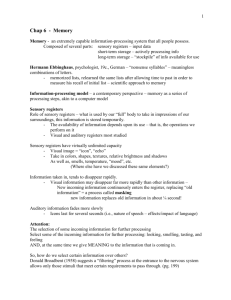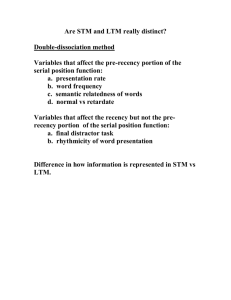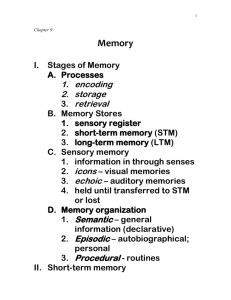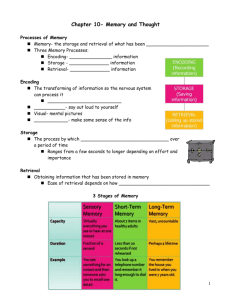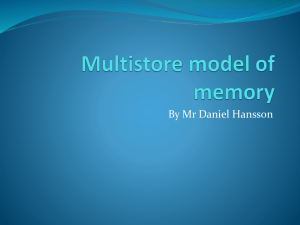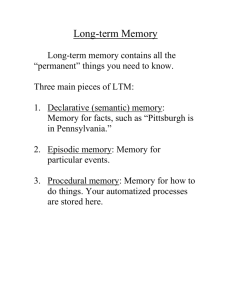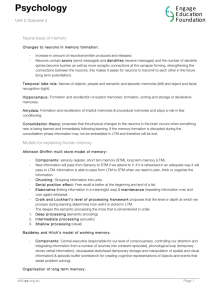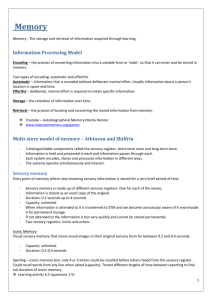Memory Overview Short-term (working) memory Long
advertisement
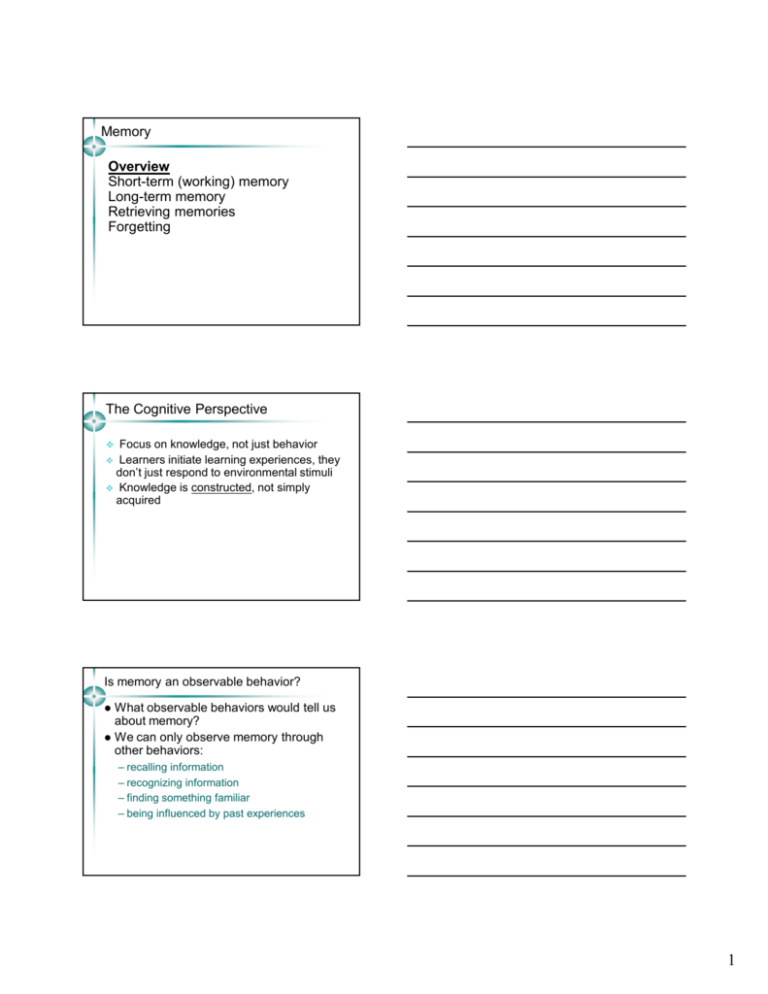
Memory Overview Short-term (working) memory Long-term memory Retrieving memories Forgetting The Cognitive Perspective Focus on knowledge, not just behavior Learners initiate learning experiences, they don’t just respond to environmental stimuli Knowledge is constructed, not simply acquired Is memory an observable behavior? What observable behaviors would tell us about memory? We can only observe memory through other behaviors: – recalling information – recognizing information – finding something familiar – being influenced by past experiences 1 Basic Model of Memory Perception see hear touch taste smell Working Memory or Short Term Memory (STM) Sensory Store Long Term Memory Human Memory Encoding Storage Retrieval Sensory Memory The five senses Sensory register Large capacity Short duration 2 Sensations we pay attention to often are encoded into short-term (or working) memory. see hear touch taste smell Sensory Working Memory or Short-Term Memory (STM) Attention Store Since you can only pay attention to a certain number of things at a time the capacity of STM is necessarily limited. Working Memory • aka: Short-term memory Capacity: 5 - 9 separate, meaningful items Duration: 5 to 20 seconds Components: • Articulatory loop rehearsal system • Visuo-spatial sketch pad • Executive control system How can we extend the length of time we can hold info in STM? see hear touch taste smell Sensory Store How can we increase the capacity of STM? Attention Working Memory or Short Term Memory (STM) Maintenance rehearsal Working Memory or Short Term Memory (STM) Chunking! 3 Retaining Information in WM Rehearsal can increase duration – Chunking – Maintenance rehearsal – Elaborative rehearsal Serial Position Effects Retaining Information in WM Rehearsal can increase – Chunking – Maintenance rehearsal – Elaborative rehearsal duration Forgetting – Interference – Decay Information that is elaborated often makes it into Long Term Memory (LTM) Information in LTM is not in immediate consciousness… ...until it is accessed or retrieved. Who did you take to your high school prom? What is the capital of Illinois? Working Memory or Short Term Memory (STM) Elaborative rehearsal The capacity of LTM is potentially unlimited ! Long Term Memory Episodic Procedural Semantic 4 Long-Term Memory Storage takes more time & effort Unlimited capacity; Unlimited duration Contains visual or verbal or a combination of codes Retrieval may be troublesome Types of Long-term Memory Episodic (Autobiographical) Semantic Procedural Types of Memory Episodic Semantic Procedural Yesterday’s golf outing The concept airplane How to give a presentation 5 Semantic Memory Memory for Meaning - language, concepts Contents: verbal & visual Organization: Schemas Propositions/Propositional Networks Images Story Grammar Scripts Propositional Network aka: Semantic Network LTM Storage Strategies Elaboration Organization Context 6 Retrieval & Forgetting Spread of activation Reconstruction Decay Interference • retroactive, proacative Basic Model of Memory Forgetting Working Memory or Short Term Memory (STM) Sensory Store Long Term Memory What happens when a piece doesn’t work? hippocampus HM had seizures. At age 27, he had surgery to remove a portion of the hippocampus. After the surgery, the seizures were less severe. However, HM lost the ability to form new memories. HM’s lesion brain stem HM died in 2008, but his memories stopped in 1953. He could only remember things for a few minutes. 7 HM had ANTEROGRADE AMNESIA HM could not form new memories (post 1953) Brain injury (or in the case of HM, surgery) ??????????? can recall old memories 1953 past future There is also RETROGRADE AMNESIA aka “Soap Opera Amnesia” (cannot access past memories) ??????????? can build new memories future past brain injury Retrograde amnesia typically results from accidents or a blow to the head. It tends to be less common, less severe, and more shortlived than anterograde amnesia. Summary (1) Memory includes: encoding, storage, and retrieval (2) Sensations come into sensory memory (3) Information attended to goes to STM (4) Elaborated information goes to LTM (5) LTM stores episodic, semantic, and procedural memories (6) Retrieval from LTM depends on context (location, processing, mood, test type) (7) Amnesics have trouble mostly with episodic memories (still remember the meaning of words and concepts, how to tie shoes, etc.) 8

